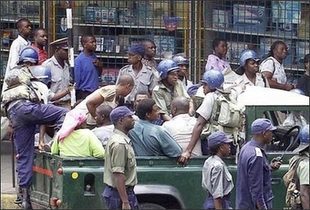
This report documents human rights violations experienced by female, male and transgender sex workers in four African countries (Kenya, Uganda, South Africa and Zimbabwe), and describes barriers they face to accessing health services. Through cross-country comparison and documenting sub-regional trends, the study moves beyond previous often-localised descriptions of violations against sex workers in Africa. The study also fills information gaps about violations in male and transgender sex workers in this setting.
Article in PLoS ONE 6(12): e28363.
Background
An article in the Journal of Drug Issues, Volume 41, Issue 2, Spring 2011, p.233-252.
This article reports on the findings of a study of the sex work industry in Cape Town that was undertaken by the Institute for Security Studies (ISS) and the Sex Worker Education and Advocacy Taskforce (SWEAT) between 2006 and 2008. The study employed qualitative and quantitative methods to gather data about inter alia, the size of the sex work industry in Cape Town, working conditions in the industry, recruitment practices, factors that resulted in women working in the industry, and the extent of human trafficking in the industry.
International sporting events are increasing in frequency and magnitude. It is estimated that the FIFA World Cup brought close to 400 000 visitors to South Africa in 2010. Little research has been conducted into the demand and supply of paid sex during big sporting events and where the topic has been explored, the focus tends to fall on speculation around human trafficking for the purposes of sexual exploitation, rather than on adult, consensual sex work.
A report by a South African NGO that shows how wrong the predications about commercial sex in South Africa during the world Cup were. The question is will it prevent disinformation and hysteria surrounding sporting events in future.
This report argues that decriminalisation of sex work is as much a public health issue as an HIV and AIDS prevention issue. It outlines several key issues, considerations, challenges and recommendations for policy-makers, NGOs, sex workers and other actors in the fields of HIV and human rights, to help build a supportive and enabling environment for sex workers to realise their rights.
A decision by the Labour Appeal’s Court, to overturn a 2008 ruling by the Labour Court that a sex worker is not entitled to protection against unfair dismissal as the field of work itself is criminal, could be opening up a Pandora’s Box. In effect it means that the Commission for Conciliation, Mediation and Arbitration (CCMA) would need to be able to establish a quantum to compensate “Kylie” for her loss as a result of her dismissal because the alternative – ordering reinstatement – may be considered state sanctioned criminal activity.
www.sasexwork.org is a new website from the Cape Town based NGO the Sex Workers Education and Advocacy Task force (SWEAT) and includes information generated by the Sisonke Sex Workers Network. It focuses on the human rights of sex workers and the legal debates around sex work.

